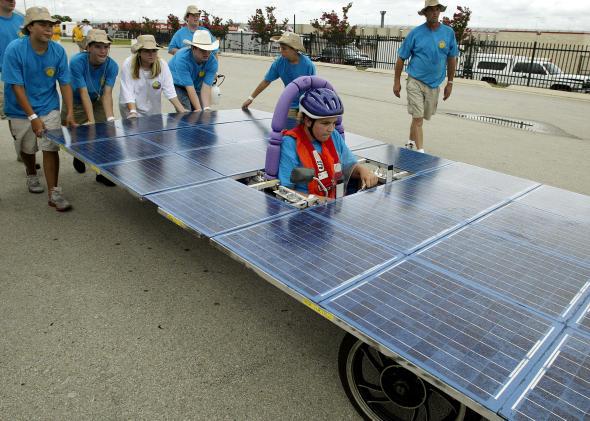There’s been a lot of anxiety in climate change circles after Tuesday’s election ushered in a Republican takeover of the U.S. Senate. The Wednesday morning headlines were dire, including this one from Vox: “The biggest loser in this election is the climate.”
On its face, I agree. The chances of bold climate action within the next two years took a big hit Tuesday. Coupled with the latest scientific consensus that we’re quickly reaching the end of our carbon budget, the world can’t afford another delay. As my colleague Phil Plait said on Election Day, Tuesday’s vote “quite literally affects the future of humanity.”
But this election cycle, campaigners concerned with the future of the planet also won a subtle but extremely important victory: Climate change is something people are finally talking about.
According to exit poll data, global warming is now the most polarizing issue to Republicans—beating even Obama’s signature health care laws. But at least it’s an issue. This is in sharp contrast to 2012, when the two presidential candidates barely mentioned the issue at all. Even if the 2014 election wasn’t primarily about climate, it was one of the social issues that resonated most strongly with voters.
Besides simply talking about the issue, there were tangible victories as well. The ongoing, successful carbon-trading platform in the Northeast is set to add Pennsylvania as a member. A climate-focused super PAC survived its initial election cycle with an encouraging win-loss record. A western North Dakota tribal election winner promised to crack down on America’s biggest oil boom. Billionaire environmentalist Tom Steyer, though he didn’t strongly influence election results, now has the infrastructure in place to battle in 2016. Andrew Freedman at Mashable has a useful breakdown of a few others.
“Our issues have been an important part of this election, and while they may not have been the largest part, polling clearly shows they weren’t the liabilities our opponents hoped they’d be,” Sierra Club political director Melissa Williams told Politico. “That is momentum to build on and a clear signal to candidates in elections to come.”
If anything, 2014 was another sign of the gradual shift toward broader Republican support for action on climate change.
Yes, the new Senate majority leader will be Mitch “I’m not a scientist” McConnell. And sure, the Senate Environment and Public Works Committee will be led by Oklahoma’s James Inhofe, the man who called human-caused global warming “the greatest hoax ever perpetrated on the American people,” cited the Bible to defend his position, and led a witch hunt designed to manufacture public distrust of leading scientists.
But in this election cycle, there are fresh signs the Republican Party is beginning to rethink its position on climate. A recent poll of self-identified Republicans found that only one-third of respondents agreed with the Republican Party position on climate change. There’s also been a noticeable backlash against politicians feigning ignorance by touting their lack of formal scientific training. In 2016, it’s now less likely that a presidential candidate can get away with flat-out denial that climate change exists and is largely caused by human activity. As the evangelical Christian climate scientist Katharine Hayhoe points out, it’s not difficult to see how action on climate change could become a core conservative issue.
In the meantime, Obama’s team of climate negotiators has spent years ensuring the next international climate agreement, unlike the failed Kyoto Protocol, won’t require Senate approval.
As long as fossil fuel money influences elections, coal- and oil-state senators like McConnell and Alaska’s Lisa Murkowski will vote to continue with the status quo. But that too could quickly change. The cost of solar power continues to plummet, and in just one or two election cycles, it will outcompete coal in price. We may soon see red-state senators changing their tune.
